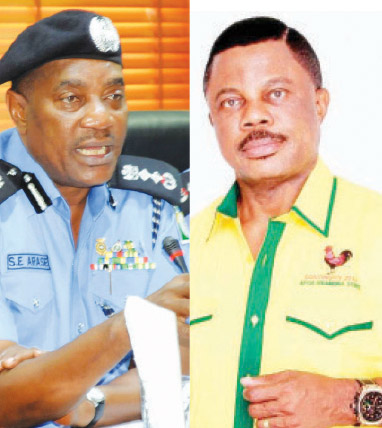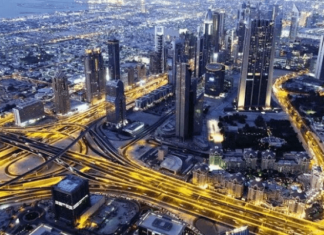There may be more to the recent crisis in Nkpor and Onitsha axes of Anambra State, leading to the death of many members of MASSOB/IPOB, Special Correspondent, OKEY MADUFORO, reports.
Until last Monday, Anambra State Commissioner of Police, Hosea Karma, had literally become a celebrity.
Karma had been celebrated as a success story in battling violent crimes in the state. That towering profile, however, got dented following the excessive use of force by men of his command against armless members of Indigenous Peoples of Biafra (IPOB), last week. The confrontation occurred when IPOB members and their Movement for the Actualisation of the Sovereign State of Biafra (MASSOB) counterparts embarked on rally to commemorate the declaration of the defunct Republic of Biafra by Emeka Odumegwu Ojukwu (of blessed memory) on May 30, 1967. The encounter left dozens of Igbo youths dead.
At the moment, Karma is struggling to explain away the crude antics of his trigger-happy subordinates in killing defenceless protesters in Nkpor and Onitsha towns as exercise borne out of extreme provocation.
The Police Public Relation Officer (PPRO), Ali Okechukwu, had earlier confirmed that 26 suspects were arrested, without putting figures on the number of deaths, which he claimed was exaggerated. Embattled residents of Nkpor and Onitsha, however, accuse him of being economical with truth. In fact, by the time the smoke of the Nkpor/Onitsha disturbances had ebbed, sources indicated that more than 50 youths of various ages had been decimated by the ill-tempered security agents. Unfortunately, Karma told TheNiche in interview that nobody was killed. That was even after military authorities had confirmed that five IPOB/MASSOB members were killed.
Mrs. Beatrice Nwankwo, a restaurateur, who witnessed the Nkpor killing, swore to TheNiche that the members of IPOB and MASSOB who took part in the rallies had no arms with them and were only chanting protest songs when the security operatives opened fire on them.
“I closed my shop because I was afraid of what might happen. Then some of my colleagues’ (shops) were open and people gathered around the shops to drink.
“Once in a while, they would sing pro-Biafra songs and danced around the main road. Some of the policemen entered where they were dancing and there was a fight. I cannot say exactly what led to it. Soon, the policemen went back and all we saw and heard were gun shots. People started running for safety and those that were unlucky were hit by the bullets.
“Policemen were not the only ones engaged in the shooting; soldiers also participated,” she said.
Narrating his ordeal, a trader in Obosi Market near Nkpor, Marcel Adimora, said he had visited a friend at the community when he got trapped in the protest.
“I quickly said my last prayers awaiting death to come. A young man in his late 20s or maybe 30s was standing behind me when he was hit by the bullet. It would have been me. The boy just shouted loudly and fell by the road side. He had no gun on him. He was not with the crowd that was protesting. But he was shot dead by the soldiers,” Adimora lamented.
Police and military authorities, however, insist that the officers acted in self defence, blaming the protesters for the ugly development.
At the 302 Artillery Regiment, Onitsha, the Commander was said to be away on official assignment, and no one offered to speak on the matter.
But inside a canteen within the barracks, some soldiers spoke in hushed tones about the killings.
“That (the shooting) was unprofessional on the part of some of these security personnel. Even under extreme provocation, you can only fire tear gas or hot water. You do not go into combat with them because they are not trained,” one of the soldiers was overheard speaking.
His colleague however countered, hinging the blame on human error.
“We are all human beings and not all of us can withstand the provocation. These people are all touts and they can go to any length to annoy you. They started firing those local guns by aiming at you. So you have no choice but to defend yourself. That policeman that died was killed because he was trying to play by the rules and they killed him. He had a good gun to protect himself, but he did not,” he argued.
Obiano shares in the blame
Anambra State governor, Willie Obiano, is also being blamed for the high death toll. Unconfirmed sources alleged that information had filtered out two days before the date for the rally about a pro-Biafra protest, adding that the authorities in the state were in the know, though unofficially.
The source insisted that Obiano could not claim to be ignorant of the move and should have taken appropriate measures. The failure to do so, he said, accounts for why he is being blamed for those lapses that saw the rally going awry.
To worsen matters, Obiano was even accused of ordering security operatives to shoot at any protester on sight.
Commissioner for information. Tony Nnacheta, has however denied this.
“I want to make it clear that at no time did His Excellency give any order for shoot on sight. He will never ever do that and he is mindful of its grave consequences at this point. The security operatives know what to do and not shoot on sight,” he said.
He blamed a section of the press for not presenting what happened appropriately.
Nnacheta regretted that the peaceful demonstration by youths who allegedly belong to MASSOB and IPOB to mark the Igbo Day was hijacked by hoodlums whose designs were antithetical to the peace and security of the state.
The elements who infiltrated the peaceful demonstration, Nnacheta alleged, turned violent at Nkpor; fired live bullets at the policemen who were detailed to watch the procession and ensure that it was peaceful and burnt down a patrol van to send a dangerous signal to the entire neighbourhood that Anambra had lost the peace it had all enjoyed for two unbroken years.
MASSOB/IPOB not cowed
Spokesman for MASSOB, Uchenna Madu, and his IPOB counterpart, Emmanuel Powerful, denied any charge of their members carrying arms, stressing that even with what the groups had passed through, they would not be cowed.
“We were not carrying any weapon as being claimed by the security operatives, but we were only showing our love for the late Dim Chukwuemeka Odumegwu Ojukwu who declared Biafra on May 30, 1967.
“As we were working along the road, these people (security agents) swooped on us and opened fire. Most of them who were not lucky died immediately, while others sustained gunshot injuries.
“We are not violent; we do not know why anybody would shoot harmless people. But look at what is happening in the North East and Niger Delta. Why is our own in Igbo land different?” they asked.
They alleged that the killings were indications of the federal government’s attempts to silence the Igbo, vowing however not to give in.
Arase joins the fray
But with the Inspector-General of Police (IGP), Solomon Arase, ordering his men to disarm the MASSOB/IPOB agitators that have all along maintained their non-violence posture, there are fears that the disturbances in the South East may not be over yet. This fear takes root in the likelihood of overzealous policemen or those intending to settle scores arresting even non-members of the groups on trumped up charges.













